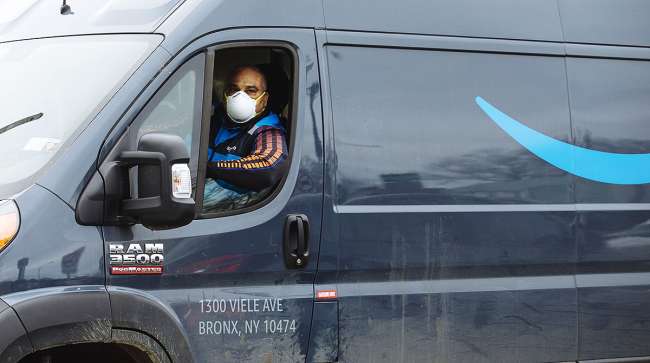Staff Reporter
ATRI Coronavirus Study Shows Truck Activity Spike, Dip in Six States

[Ensure you have all the info you need in these unprecedented times. Subscribe now.]
Although trucking activity spiked across six states during the coronavirus pandemic’s early days, a recent analysis from the American Transportation Research Institute indicates that such freight activity has declined.
ATRI released on April 22 research into COVID-19’s impact on the trucking industry. The analysis examined activity from Feb. 9 through April 18 across California, Florida, Illinois, New York, Pennsylvania and Washington. ATRI Senior Vice President Dan Murray noted these states represent a geographic sprawl and also are important freight-generating states.
From early February into March, ATRI’s data reflects a spike in initial truck activity. This indicates industry response to high consumer demand for items such as nonperishable food, paper products and emergency medical supplies.
New Data Show #COVID-19 Impacts on the #Trucking Industry https://t.co/vLCAfeKFcZ #ATRI #TruckingResearch — Rebecca Brewster (@ATRIPREZ) April 23, 2020
However, the data also show that trucking operations declined in April, reflecting the dozens of statewide stay-at-home orders that shut down sectors of the economy. Murray said the economy has declined in part because there is little demand for goods other than critical items, such as food.
Bob Costello, chief economist for American Trucking Associations, noted that people who buy 50 cans of soup eventually have to stop buying soup and start eating it.
“That is documenting that consumer hoarding that immediately occurred after the shutdowns,” Murray said. “Some of us might even go so far as to call it a consumer freakout. Who races out and buys 50 [or] 60 rolls of toilet paper unless there’s a panic? After the hoarding response dissipates, then you see net reductions in truck activity, which is where we’re at now.”

ATRI conducted the analysis, which considers all sectors and types of trucks, by converting information from its truck GPS dataset into a truck activity index. Using a methodology similar to that of the Consumer Price Index, Murray explained that ATRI picked Feb. 9 to serve as a “generally pre-COVID” baseline for the research because the date preceded most statewide stay-at-home orders. ATRI used truck activity data from that static point in time to measure subsequent changes that resulted from the virus’ outbreak in the U.S.
California was one of the first states to institute a stay-at-home order, which went into effect March 19. Although California experienced an upward spike in truck activity during the week of March 1, trucking operations in the state are now down 8.3% from levels recorded in early February.
Truck activity in Florida, Illinois and New York spiked the week of March 8 but has fallen, on average, by more than 10% from levels recorded Feb. 9. Similarly, trucking spiked in mid-March in Pennsylvania and Washington but is down by an average of nearly 9% since Feb. 9.
As states contain the virus and slowly begin to reopen parts of their economies, Murray expressed optimism that trucking activity will return to stable baseline levels.

“We are hopeful that [New York’s uptick] may be a positive economic indication that the decline has stabilized and might be turning around,” he said. “I believe there’s a lot of pent-up demand. I have a funny feeling people are just going to race to stores, restaurants and all the places they haven’t been for a month and splurge.”
Although Costello acknowledged there is pent-up demand for services and goods since the pandemic struck, he doesn’t anticipate a massive surge in activity as states begin to reopen for business.
“I think you still have a lot of leery people,” Costello said. “Will you see a bump in activity? Of course you will. But you are not going to see a surge in activity as people are leery.”
Murray said the ATRI team is wrapping up data analysis on a survey the institute conducted in partnership with the Owner-Operator Independent Drivers Association Foundation. The survey, launched in late March, solicited input from truck drivers and motor carrier staff who have encountered coronavirus effects, such as limited shipper access, altered distribution patterns and traffic issues.
Want more news? Listen to today's daily briefing:




